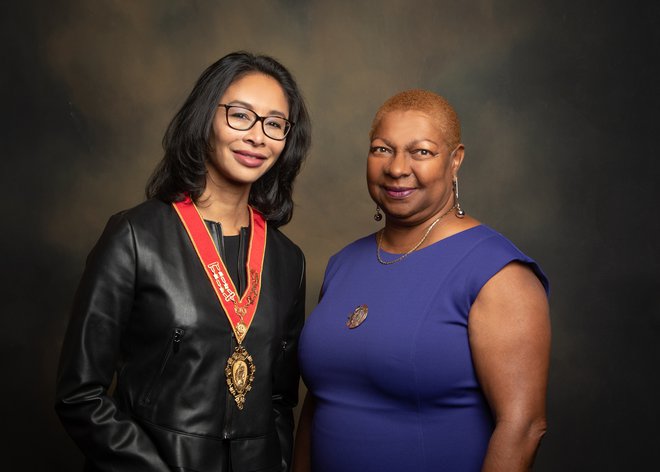
Dr. Allan L. Bailey, Family Medicine, Spruce Grove
What can I say about three decades as a member of an honoured profession and a respected organization? I could say I was an “early adopter,” having been a medical student representative on the AMA Board of Directors. I could say I was an inveterate innovator, co-designing primary care networks and co-creating a place in AMA governance for the PCN Provincial Zone Leads and the Primary Care Alliance. I could say I have been a collaborator, having worked with so many outstanding health care leaders, AMA executive and staff.
Circumstances have allowed me to play a part in developing a stronger voice for primary care in Alberta. The results are still evolving but include changes in the Representative Forum, improved work life for family physicians, more effective advocacy with government and policymakers, better alignment of compensation for physicians with the desired outcomes for population health, and recognition that income equity is critical to the health and sustainability of the profession and of the AMA.
To my colleagues, I would say that whatever my contributions, they are overwhelmingly secondary to what I have received in the process – the learning, the relationships, and the sense of being part of something that matters.

Dr. John E. (Jack) Bromley, General Practice, Red Deer
I first became involved with the AMA in the late 1980s as president of the Northwest Territories Medical Association. With the AMA’s support, I worked to bring the NWT into active participation as a division of the CMA, and I represented the NWT on the CMA Board of Directors for three years. In Alberta, I became involved with the PSA Screening Guidelines Committee, worked with the Central Zone Medical Staff Association, and served for 17 years on the Representative Forum. In my role as director of the Rural Alberta North family medicine residency program in Red Deer, I have drawn on my 16 years as a full-service GP in remote rural practice in the NWT and Papua New Guinea.
I am very encouraged by the recent direction of primary care reform, and am especially pleased with the Representative Forum’s recognition of the need to reduce inequities in remuneration within and between different sections.
I have been proud to be a part of the AMA and the CMA, both strong organizations with a genuine interest in the public and in the profession. I encourage younger colleagues to get involved and exercise the opportunity to have an active influence.

Dr. Janette A. Hurley, Integrative Family Medicine, Addiction Medicine, Underserved/Marginalized Medicine, Calgary
My favourite Health Issues Council initiative was the “Condom and the Pill” project, a brave stand on STI prevention taken by the AMA. When Alberta Health and Wellness attempted to cut funding for tubal ligations, a group of female docs hastily gathered around my kitchen table and started a petition, supported by the AMA. The cut was halted.
Twenty-three years ago I attended Health Issues Council meetings with my breastfeeding baby in my sling, helping to normalize bringing non-disruptive babies to AMA meetings. My advocacy helped to create the AMA Parental Leave Program. Most recently, I participated in meetings with the AMA and Alberta Health to change the language and format of AISH forms.
The practice of medicine is the highest professional calling one can have. At times, advocating for your patients and for societal change can seem lonely, but involvement with the AMA buffers that loneliness since the AMA always has its members’ backs.

Dr. Patrick J. (P.J.) White, Psychiatry, Edmonton
I joined the AMA on my second day in Canada in May 1989. Since then, I have been a member of the Representative Forum, sat on the Board of Directors for seven years, and served as president. In my year as president, we began the negotiations that resulted in an agreement two years later.
I believe strongly in the need for a better mental health care system, and I have spent a considerable amount of time in recent years advocating with the government on mental health issues. I am currently the medical director of Alberta Hospital, in which role I am part of a wide-ranging planning exercise to develop and expand services for mental health in conjunction with the Department of Psychiatry, a role important to me as a psychiatrist and as an advocate for a better mental health system.
I think it is essential to be a member of our representative organization where we can all speak with one voice on behalf of physicians and for the sake of a better health care system.
Dr. Richard G.R. Johnston, Critical Care, Anesthesiology, Edmonton
(No photo available)
I am most proud of my 20 years as chair of the Negotiating Committee and on the committees that managed agreements with government and health authorities. We were able to capture the economic value physicians deserved and to direct some of those funds in ways that markedly improved health care, such as after-hours payments, rural/remote/northern payments, and benefits like CME, parental leave, and the Physician and Family Support Program. Money has also been devoted to reducing disparities among groups through differential allocations, in an attempt to ensure that all physicians are appropriately rewarded for their work.
We are the strongest medical association in Canada because we have found ways, through good leadership and professionalism, to have respectful, data-based discussions on both economic and professional issues.
William Osler, the Canadian physician who has had the most influence on the development of modern medicine in this country, wrote on the need for individuals to contribute to the profession. I encourage all physicians to participate in the AMA by carefully reading publications and serving on committees in the AMA, the College, and AHS. It is only through such organizations that we can influence decisions and work to maintain a strong health care system for our patients.